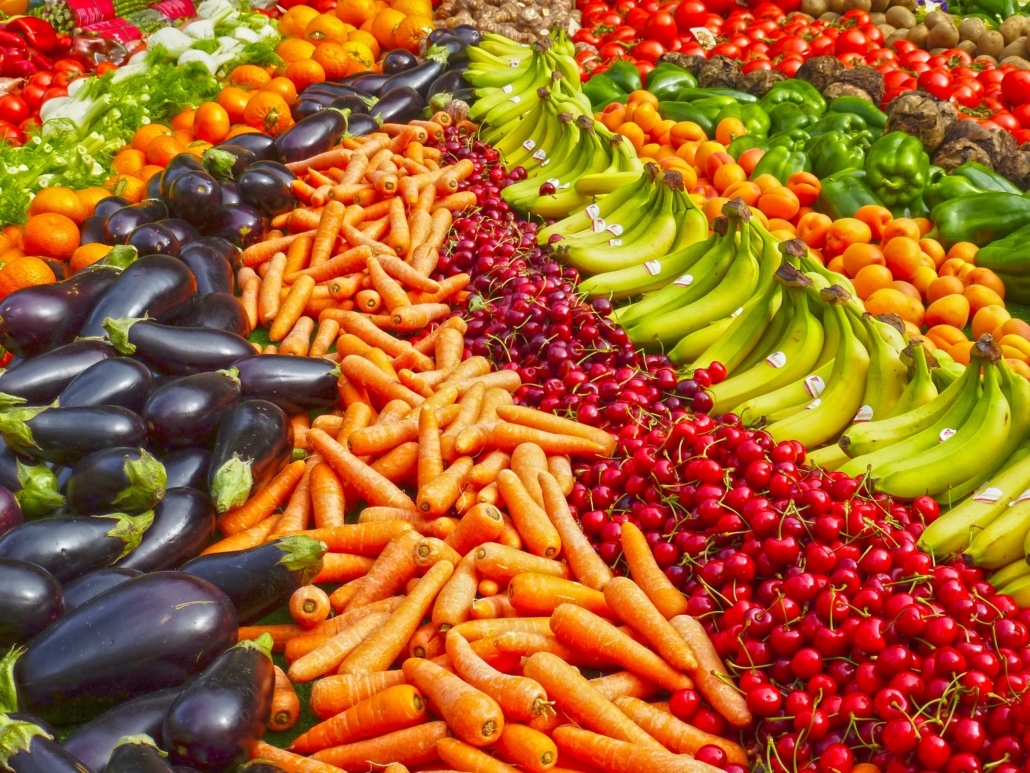Guest Post by Kirsten Halbrich Oudin, ASN’s Dietetic Intern
I am a dietetic intern with the American Society for Nutrition for the month of February 2019. February also happens to be National Cancer Prevention Month which hits very close to home because my father lost his battle with lung cancer in November 2016 at 61 years young. It is kismet that my rotation lined up with this month’s blog entry on the linkages between nutrition and cancer, specifically related to prevention and adverse reactions to treatment. As an aspiring Registered Dietitian, I heavily researched diets to help my dad as he went through the difficult diagnosis and treatment. What I found was that every cancer is different, that’s obvious; however, no matter the type of cancer, mechanism of onset, or even genetic predisposition, a well-balanced diet, coupled with regular exercise, is paramount for cancer prevention as well as treatment.

Nutrition for Cancer Prevention
According to the World Health Organization, “between 30–50% of cancers can currently be prevented by avoiding risk factors and implementing existing evidence-based prevention strategies.” Among these evidence-based strategies are the 2012 American Cancer Society (ACS) Guidelines for Cancer Prevention which have a strong correlation between increased adherence to diet recommendations and decreased cancer mortality. See below for detailed diet recommendations.

2012 ACS Guidelines – Nutrition Recommendations for Individual Choices:
Consume a healthy diet with an emphasis on plant foods.
Choose foods & beverages in amounts that help achieve & maintain a healthy weight.
- Read food labels to become more aware of portion sizes & calories consumed. Be aware that “low fat” or “nonfat” does not necessarily mean “low calorie”.
- Eat smaller portions of high-calorie foods.
- Choose vegetables, whole fruits, and other low-calorie foods instead of calorie-dense foods such as French fries, chips, ice cream, doughnuts, and other sweets.
- Limit consumption of sugar-sweetened beverages (soft, sports, & fruit-flavored drinks).
- If eating out, select foods lower in calories, fat & added sugar and avoid large portion sizes.
Limit consumption of processed meats & red meats. *Consumption of processed meats and meats preserved by methods involving smoke or salt increases exposure to potentially carcinogenic chemicals, and therefore should be minimized.
- Minimize consumption of processed meats such as bacon, sausage, lunchmeats, and hot dogs.
- Choose fish, poultry, or beans as an alternative to red meat (beef, pork, and lamb).
- Bake, broil, or poach meats, poultry and fish instead of frying or charbroiling.
Eat at least 2.5 cups of vegetables & fruits each day.
- Include vegetables and fruits at every meal and for snacks.
- Eat a variety of egetables & fruits each day.
- Emphasize whole vegetables & fruits; choose 100% juice if you drink vegetable or fruit juices.
- Limit consumption of creamy sauces, dressing, and dips with vegetables & fruits.
Choose whole grains instead of refined grain products.
- Choose whole-grain foods such as whole-grain breads, pasta, cereals (barley & oats) instead of those made from refined grains; and brown rice instead of white rice.
- Limit consumption of other refined carbohydrate foods, including pastries, candy, sugar-sweetened breakfast cereals, and other high-sugar foods.
If you drink alcoholic beverages, limit consumption.
- Drink no more than 1 drink per day for women or 2 per day for men.

Nutrition During Cancer Treatment
There have never been so many different options of cancer treatments available from chemotherapy, radiation and surgery to immunotherapy, hormone therapy and clinical trials. With additional treatment options comes the potential for additional side effects. Many of these side effects can be combatted with appropriate diet therapy. The main nutrients to focus on during cancer treatment are protein, carbohydrates, fats, water, vitamins & minerals. Protein needs often increase to support muscle strengthening and maintenance for resisting infections, recovering from illnesses, and repairing tissues. Carbohydrate sources are essential, choosing whole grains and complex carbs over empty carbs and sweets promote sustainable energy and nutrient-dense foods. Fat sources of “healthy” mono- and polyunsaturated fats over “unhealthy” saturated and trans fats promote heart health and cholesterol management. Water is vital, especially if experiencing vomiting or diarrhea, often increasing fluid needs beyond the standard 64 fluid ounces daily to maintain homeostasis and replenish cellular health. Fluid needs are not limited to water and may include soup, broth, milk and gelatin. Vitamin & mineral needs may also increase, especially if experiencing decreased appetite, making multivitamins or mineral supplements suitable alternatives for sources of the essential nutrients the body systems need to promote energy.
Join ASN!
And get access to immersive learning experiences, collaboration, and networking with the greatest minds in nutrition.
*Consult a Doctor and/or Registered Dietitian before adding supplements or altering diet in any way. Type of cancer, diagnosis, prognosis and treatment are critical for determining appropriate dietary action.
Emerging Cancer Nutrition Research
There are many emerging trends, evolving research, fads and fables circulating around the role nutrition plays in relation to cancer. Some of these are unsupported rumors with little to no evidence to back them up such as the myth that coffee is directly related to an increased risk of cancer and therefore requires a “May cause cancer” disclaimer at certain coffee shops. Another common misconception is that dietary supplements are equivalent to whole food sources; however, particularly with regards to cancer prevention, antioxidants, vitamins & minerals should ideally be consumed as part of the diet (if possible). The chart below briefly reviews additional food items thought to effect cancer risk.
| Food Category | Increased Risk of Cancer? | Reduced Risk of Cancer? | Additional Info |
| Nonnutritive Sweeteners & Sugar Substitutes | Inconclusive | X | Safe when consumed in moderation |
| Pesticides & Herbicides | Not in low doses found in most crops | X | Wash fruits & veggies before eating |
| Phytochemicals | X | Inconclusive | Best ingested in whole foods, not supplements |
| Salt | Inconclusive | X | Less salt cured/pickled food may prevent some cancers |
| Selenium | X | Inconclusive | Thin line between safe & toxic dose (200 μg daily UL) |
| Soy Products | X | May reduce risk of breast, prostate, or endometrium cancers | Traditional soy products (tofu) not isolated soy protein supplements |
| Sugar | May indirectly increase cancer risk via obesity | X | Due to high caloric content and no nutritive value |
| Tea | X | Inconclusive | Source of antioxidants, polyphenols and flavonoids |
| Trans Fats | Inconclusive | X | Minimize intake for overall heart health |
| Turmeric & Other Spices | X | Inconclusive | Rolling studies on turmeric, capsaicin, cumin and curry |
| Fruit & Veggies | X | May reduce risk of lung, mouth, pharynx, larynx, esophagus, stomach and colorectal cancers | Specific anticancer compounds present in fruits and veggies are still unknown |
| Vegetarian Diets | X | Mixed findings: Yes in UK;
Inconclusive in US | May need to supplement B12, Zinc, Iron & Calcium |
| Vitamin A (supplement) | High doses may increase lung cancer risk | No | Promotes tissue health |
| Vitamin C | X | Yes in food sources;
No in supplement form | Vitamin C rich foods are favored over supplements |
| Vitamin D | X | May reduce risk of colorectal cancer | Many people in America do not get enough Vitamin D |
| Vitamin E (supplement) | 1 study showed increased risk of prostate cancer | No | Not recommended to deter cancer or chronic diseases |

Other Food Related Risk Factors:
- Food Additives & Contaminants may increase the risk for certain types of cancers through agricultural exposure to growth hormones and endocrine disrupting chemicals such as bisphenol A and phthalates; unintentional chemical or environmental fungal contamination; and elemental carcinogen transfers through soil, water, and food supplies (i.e., heavy metal, cadmium, or mercury). The Food and Drug Administration (FDA) has declared that any new, intentional additives must be tested and cleared prior to public distribution.
- Food Processing has both positive and negative effects on cancer risk. Freezing and canning can promote bioactivity in fruits and vegetables which decrease risk of certain cancers. However, refined grains have removed the dietary fiber that helps to lower cancer risk; and preserved meats with added salt and nitrites are higher in carcinogens, a known cause of cancer.
- Microbial Food Safety involves food irradiation to reduce microbial contamination and food poisoning; although radiation is a known carcinogen it does not have the same effects on food as it does on a living person.
- Organic Foods are not supported by evidence to be a better or worse choice than conventional foods so continue making vegetables, whole grains, and fruits the focus of all meals or snacks regardless of growth method.
Sample Recipes:
- Breakfast Sausage: https://healthylivinghowto.com/say-goodbye-to-jimmy-dean/
- Grilled Greek Kabobs: http://www.cookingclassy.com/2015/04/greek-chicken-kebabs-with-tzatziki-sauce/
- Parmesan Spaghetti Squash: https://www.mom4real.com/parmesan-spaghetti-squash/
- Mashed Cauliflower: http://steamykitchen.com/20966-cauliflower-mashed-potatoes-recipe.html
Professional Resources:
- Find a Registered Dietitian: https://www.eatright.org/find-an-expert
- American Association for Cancer Research @ https://www.aacr.org
- American Cancer Society @ https://www.cancer.org
- WHO International Agency for Research on Cancer @ https://www.iarc.fr
- Mesothelioma & Asbestos Awareness Center @ https://www.maacenter.org
Exceptional Science & Inspiring Speakers

Get access to over 60 hours of the best science and latest clinical information at your convenience.
References
- Aune D, Keum N, Giovannucci E, et al. Dietary intake and blood concentrations of antioxidants and the risk of cardiovascular disease, total cancer, and all-cause mortality: a systematic review and dose-response meta-analysis of prospective studies. Am J Clin Nutr. 2018;108(5):1069-1091.
- Demark-Wahnefried W, Rogers LQ, Alfano CM, et al. Practical clinical interventions for diet, physical activity, and weight control in cancer survivors. CA Cancer J Clin. 2015;65(3):167-189.
- Goulão B, Stewart F, Ford JA, et al. Cancer and vitamin D supplementation: a systemic review and meta-analysis. Am J Clin Nutr. 2018;107(4):652-663.
- Jayedi A, Emadi A, Shab-Bidar S. Dietary Inflammatory Index and Site-Specific Cancer Risk: A Systematic Review and Dose-Response Meta-Analysis. Adv Nutr. 2018;9(4):388-403.
- Kim YI. Folate and cancer: a tale of Dr. Jekyll and Mr. Hyde? Am J Clin Nutr. 2018;107(2):139-142.
- Kushi LH, Doyle C, McCullough M, et al. American Cancer Society guidelines on nutrition and physical activity for cancer prevention: Reducing the risk of cancer with healthy food choices and physical activity. CA Cancer J Clin. 2012;62(1):30-67.
- McCullough ML, Patel AV, Kushi LH, et al. Following cancer prevention guidelines reduces risk of cancer, cardiovascular disease, and all‐cause mortality. Cancer Epidemiol Biomarkers Prev.2011;20(6):1089‐1097.
- Schoenfeld JD, Ioannidis JPA. Is everything we eat associated with cancer? A systematic cookbook review. Am J Clin Nutr. 2013;97(1):127-134.
- The American Cancer Society medical and editorial content team. Benefits of good nutrition during cancer treatment. Last Revised July 15, 2015. https://www.cancer.org/treatment/survivorship-during-and-after-treatment/staying-active/nutrition/nutrition-during-treatment/benefits.html
- Cancer: Cancer Prevention. World Health Organization. 2019. https://www.who.int/cancer/prevention/en/
- Cancer: Key Facts. World Health Organization. 12 September 2018. https://www.who.int/news-room/fact-sheets/detail/cancer
- International Agency for Research on Cancer. Cancer Fact Sheets: All Cancers. World Health Organization. http://gco.iarc.fr/today/data/factsheets/cancers/39-All-cancers-fact-sheet.pdf
- International Agency for Research on Cancer. World Cancer Report 2014. World Health Organization. https://www.iarc.fr/world-cancer-report-content-overview/



